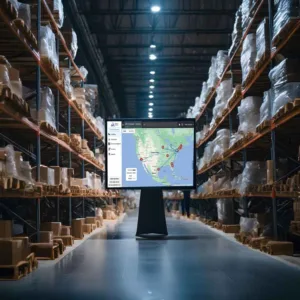
Adding a new LTL freight provider to your shipping operations can be stressful for any business.
Onboarding is a hassle.
Building trust takes time.
And freight brokers—do they really add value? Do you actually need one in your LTL shipping network? Most of your peers would say yes.
Research on supply chain outsourcing, by Gartner, shows that 81% of your peers believe working with a 3PL for their LTL freight is the best approach. Only 16% of shippers handle this function entirely in-house.
Why you should work with an LTL broker
Many shippers don’t fully understand the range of services freight brokers, also known as third-party logistics companies (3PLs), provide.
It’s a common misconception that they simply connect shippers to carriers for a fee. The reality is far different, especially in the less-than-truckload (LTL) shipping.
For inexperienced shippers, you face a higher risk of unexpected and unpleasant charges and higher rates.
For experienced shippers, a 3PL saves you money and optimizes your internal resources.
Let’s explore seven reasons why adding an LTL freight broker to your network is beneficial.
LTL Freight Brokerage Benefits
- Accessing better LTL pricing is easy.
- Finding the right service option is quick.
- You don’t have to manage your LTL carriers.
- Accessing free TMS freight technology is available.
- Freeing up your team’s time is feasible.
- Getting easier access to more carrier capacity is attainable.
- Avoiding more LTL accessorial surcharges is accomplished.
1. LTL Freight Brokers Get Better Rates
Tapping into a larger third-party logistics provider‘s (3PL) buying power enhances your ability. You secure favorable rates for your less-than-truckload (LTL) freight. You are a busy shipper.
Brokers offer two primary avenues to help you secure better rates:
- More Competitive Blanket Rates: The LTL carrier market is far more consolidated than the vast U.S. truckload market. It comprises roughly 150 LTL carriers compared to almost one million truckload carriers. This consolidation grants LTL carriers greater pricing leverage in setting rates for your freight. The tariff rates are based on their network of drivers, terminals, facilities, and priorities. You cannot get competitive LTL quotes directly from carriers. You ship only a few packages monthly as a small business. An LTL broker collaborates with you via blanket pricing. You ship under their blanket rate negotiated with carriers. The freight broker leverages their larger freight volume for pricing discounts. 3PLs like TLI are big, consistent customers for LTL carriers. Their negotiated rates beat what you can secure alone.
- Easier Access to Customer-Specific Pricing: Shippers benefit from customer-specific pricing (CSP) if they have non-standard freight. Non-standard freight includes unusual sizes, accessorials, or specific service requirements. While setting up this process can be intricate, seasoned professionals at reputable 3PLs can guide you through it. TLI launches CSP transportation RFPs regularly.

2. Finding the Right Service Option is Quick
Inexperienced shippers may not be aware of the various methods available for shipping less-than-truckload (LTL) freight.
You have multiple shipping options without booking a full truck. Options include standard LTL, volume LTL, and partial truckload.
An LTL freight broker assists you in pinpointing carriers. They find competitive rates and superior service for your required mode. They tailor a unique solution for your distinctive freight needs.
A reputable 3PL helps you balance carrier types. Types include national, regional, sub-regional, and other LTL carriers. They optimize your shipping operations by leveraging their carrier network.
Navigating this process solo demands an unsustainable investment. You would need excessive time and resources. Your 3PL representative readily accesses these options.
3. Manage LTL Carrier Relationships
As your business expands, you’ll inevitably need to collaborate with more carriers to ensure your freight reaches its destination. An LTL brokerage company is making scaling supply chains easy!
However, having more carriers involved in transporting your freight means dealing with additional points of contact, more negotiation discussions, and potentially more headaches.
Third-party logistics providers (3PLs) can streamline your relationships with carriers by:
- Establishing and monitoring Key Performance Indicators (KPIs): Your LTL broker engages with you to understand your supply chain requirements. Requirements include needs, preferences, and desired outcomes. They help identify relevant KPIs for your network. They monitor if carriers meet these KPI standards.
- Addressing performance issues directly with carriers: If carriers frequently miss estimates, damage pallets, or fail other KPIs, your 3PL addresses it. They communicate concerns directly with carriers. They collaborate on improvement strategies.
- Handling damage claims: Dealing with LTL damage claims is a hassle for any shipper. However, having the right contacts can significantly ease the process. Shipping 3PLs typically have established relationships with corporate executive-level contacts at the carriers responsible for transporting your freight. Conversations regarding damaged goods tend to progress more smoothly when conducted through a familiar and trusted intermediary.

4. Transportation Management System (TMS Technology)
3PLs understand the value of time and money, and they aim to utilize their extensive technical resources to help you save both.
When selecting a broker for your LTL freight, opt for one that offers the following technology options:
- Instant quoting and booking: Begin with a digital freight platform. Input your freight details. Retrieve instant quotes from capable carriers in their network. Book the most suitable option with one click.
- Consistent tracking across multiple carriers: Work with more carriers than your team can manage via calls or emails? A 3PL provides a solution. Their digital portal should offer a comprehensive view of your freight’s movements across your network. Purchasing departments will likewise need access for tracking inbound freight.
- API/EDI connectivity: Connect to their API or EDI. Access their array of benefits. Continue day-to-day operations in your ERP, TMS, or WMS system. You get consistent tracking across multiple carriers. This integration enables you to streamline ecommerce, billing, and shipping functions, contributing to enhanced customer satisfaction.
5. Free up your team’s time!
If your business is experiencing rapid growth, it’s likely that your internal logistics team is already stretched to its limits.
As your supply chain requirements expand, the workload to meet them increases significantly. So this is where an LTL freight broker steps in.
Some ways freight brokers can alleviate the strain on your internal team include:
- Key support: LTL freight brokers assign one or two key contacts to manage your account. They streamline all needs through one familiar face. Needs include quoting, booking, billing, and claims resolution.
- Data Management: The more loads you ship daily, the more time-consuming data entry becomes. Data includes size, weight, freight class, dates, zip codes, and more. If you need a larger team for these tasks, enlist a 3PL’s help. They ease the burden.
- Monitor Shipments: Do not worry about contacting each carrier for freight progress. Your broker monitors your network. Your broker handles that task for you.
6. LTL brokers increase your carrier base!
Thousands of LTL carriers do not operate in the U.S. But enough exist that keeping up with all is unreasonable for you. Freight brokers understand the shipping industry. So they maintain relationships with a significant subset of the LTL industry. They have carriers capable of handling your freight movements. It does not matter what you need to move or where.
Third-party logistics providers (3PLs) link shippers to various carriers. Carriers include regional, sub-regional, local, and those offering specialty services like reefer LTL.
And if your preferred carrier is unable to accommodate your shipment for any reason—whether it’s lead time, local embargoes, capacity issues, or anything else—your broker can intervene and find an alternative solution.
7. Freight brokers avoid LTL accessorials
Shipping LTL can often feel like you’re constantly being nickel-and-dimed by carriers, which can be quite frustrating.
You’re more likely to encounter fees when moving LTL freight compared to full truckload.
Your broker can help you navigate and mitigate some of the most common LTL fees.
So, here are some charges a strategic transportation freight broker assist shippers in avoiding:
- Accessorial fees: When working with a 3PL, you may find certain common LTL accessorials are more affordable or waived. This is largely depending on the shipping contract negotiated by the shipping broker with the carrier.
- Oversize load charges: A proactive LTL freight broker collaborates with you to refine shipping practices. So this enables reducing the chances of incurring fees when your freight exceeds standard pallet dimensions. This collaboration ensures smoother operations and cost savings for your shipments. This problem gets quickly compounded when a shipper working carrier direct falls under the cubic capacity rule.
- Misclassification fees: Determining freight class and NMFC codes can be challenging for LTL shippers. Your LTL shipping brokers discusses your freight’s material, density, and packaging with you in detail. Meaning, they ensure accurate freight classification every time.
Start routing freight with TLI today!
Shippers! If you’re seeking to route some freight, you’ve come to the right place. Start booking less-than-truckload freight with TLI today and discover the perfect partner for your shipping needs.